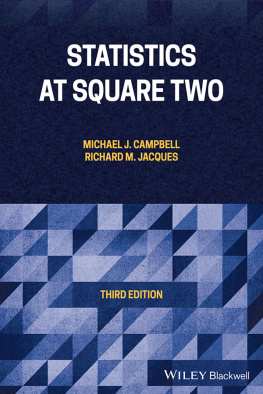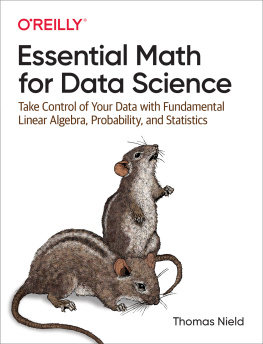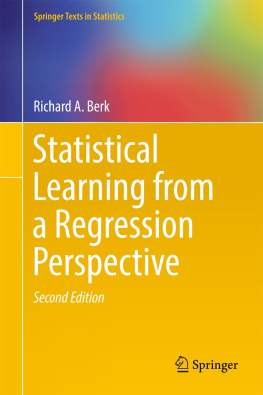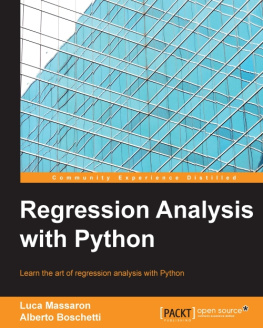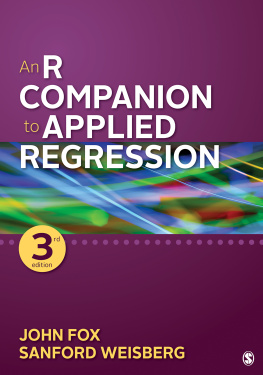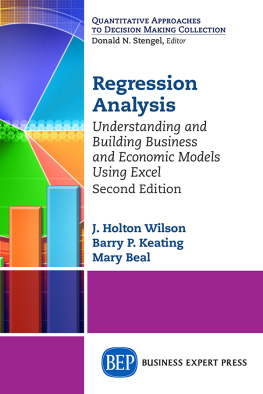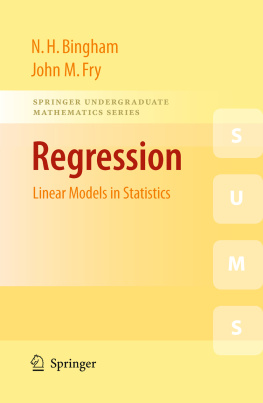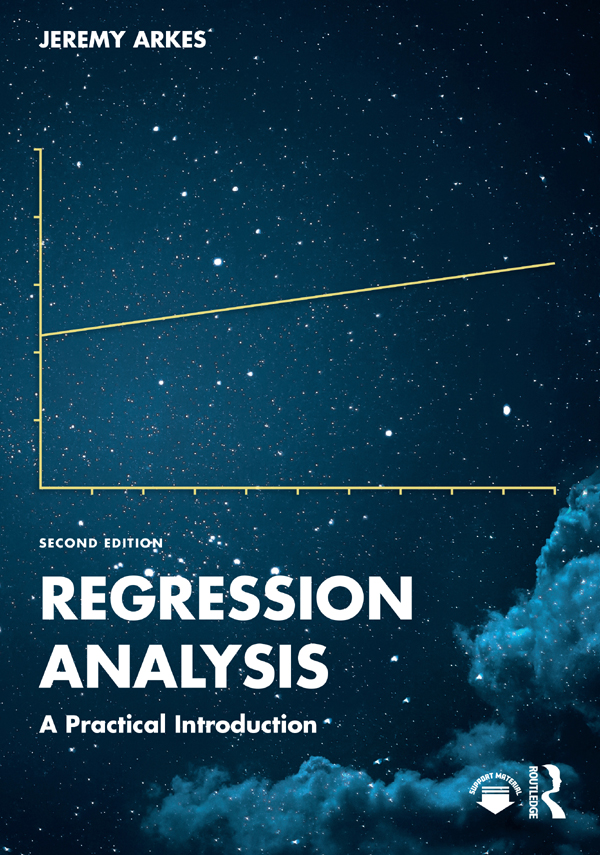
Regression Analysis
This thoroughly practical and engaging textbook is designed to equip students with the skills needed to undertake sound regression analysis without requiring high-level math.
Regression Analysis covers the concepts needed to design optimal regression models and to properly interpret regressions. It details the most common pitfalls, including three sources of bias not covered in other textbooks. Rather than focusing on equations and proofs, the book develops an understanding of these biases visually and with examples of situations in which such biases could arise. In addition, it describes how holding other factors constant actually works and when it does not work. This second edition features a new chapter on integrity and ethics, and has been updated throughout to include more international examples. Each chapter offers examples, exercises, and clear summaries, all of which are designed to support student learning to help towards producing responsible research.
This is the textbook the author wishes he had learned from, as it would have helped him avoid many research mistakes he made in his career. It is ideal for anyone learning quantitative methods in the social sciences, business, medicine, and data analytics. It will also appeal to researchers and academics looking to better understand regressions. Additional digital supplements are available at: www.youtube.com/channel/UCenm3BWqQyXA2JRKB_QXGyw.
Jeremy Arkes is a retired economics professor from the Graduate School of Business and Public Policy, Naval Postgraduate School, U.S.A. He is currently writing books on economics, nature, and basketball.
Regression Analysis A Practical Introduction
SECOND EDITION
Jeremy Arkes

Designed cover image: michal-rojek / Getty Images
Second edition published 2023
by Routledge
4 Park Square, Milton Park, Abingdon, Oxon, OX14 4RN
and by Routledge
605 Third Avenue, New York, NY 10158
Routledge is an imprint of the Taylor & Francis Group, an informa business
2023 Jeremy Arkes
The right of Jeremy Arkes to be identified as author of this work has been asserted in accordance with sections 77 and 78 of the Copyright, Designs and Patents Act 1988.
All rights reserved. No part of this book may be reprinted or reproduced or utilised in any form or by any electronic, mechanical, or other means, now known or hereafter invented, including photocopying and recording, or in any information storage or retrieval system, without permission in writing from the publishers.
Trademark notice: Product or corporate names may be trademarks or registered trademarks, and are used only for identification and explanation without intent to infringe.
First edition published by Routledge 2019
British Library Cataloguing-in-Publication Data
A catalogue record for this book is available from the British Library
Library of Congress Cataloging-in-Publication Data
Names: Arkes, Jeremy, author.
Title: Regression analysis: a practical introduction / Jeremy Arkes.
Description: Second edition. | Milton Park, Abingdon, Oxon; New York, NY: Routledge, [2023] | First edition published 2019Title page verso. | Includes bibliographical references and index.
Identifiers: LCCN 2022035701 | ISBN 9781032257846 (hardback) | ISBN 9781032257839 (paperback) | ISBN 9781003285007 (ebook)
Subjects: LCSH: Regression analysis.
Classification: LCC HA31.3 .A43 2023 | DDC 519.5/36dc23/eng/20220812
LC record available at https://lccn.loc.gov/2022035701
ISBN: 978-1-032-25784-6 (hbk)
ISBN: 978-1-032-25783-9 (pbk)
ISBN: 978-1-003-28500-7 (ebk)
DOI: 10.4324/9781003285007
Typeset in Bembo
by codeMantra
Access the Support Material: www.routledge.com/9781032257839
To my mother, Judy Arkes (19412014). She was always a voice of love, support, and reason.
Contents
Figures
Tables
Author
Jeremy Arkes grew up in Amherst, MA, amidst of the fields of Amherst College. He left this bucolic setting to attend Georgetown University for his undergraduate studies and University of Wisconsin for his Ph.D. in Economics. He spent his first ten years after graduate school working for think tanks: The Center for Naval Analyses (Alexandria, VA) and RAND Corporation (Santa Monica, CA). His main focus was on military-manpower research, but he sprouted out to other fields, such as the areas of substance use and divorce effects on children. From 2007 to 2021, he was an economics professor at the Graduate School of Business and Public Policy at the Naval Postgraduate School in Monterey, California. At NPS, besides continuing to conduct research in military manpower, he added a line of research that uses sports outcomes to make inferences on human behavior.
Dr. Arkes is now retired and writing books on nature, economics, basketball, and politics. He is the author of:
- Confessions of a Recovering Economist: How Economists Get Most Things Wrong (2022). This book highlights the mistakes that economists make and how widespread the mistakes are. Most importantly, the book provides a series of recommendations on how improve the field of economics, including his views on how undergraduate and graduate economics curricula should be redesigned.
- Exploring the Monterey Peninsula and Big Sur: A Nature and Hiking Guide (2021), which is more than a nature/hiking guide, as it is also a story on the harmony of nature, how that harmony could be disrupted, and connections to human nature.
- How to Improve the NBA: Sensible and Wacky Ideas to Fix Problems and Add Excitement (2022).
- A Year in Nature A Nation in Chaos (2022). This has a series of descriptions of and essays on a year in nature in the Monterey (California) area, on the chaotic events in the world and particularly the U.S., and reflections on the connections between nature and the chaos weve experienced.
His websites are:
- www.jeremyarkes.com
- www.montereynature.com
- https://jeremyarkes.medium.com/
- YouTube channel: Just search Jeremy Arkes.
Preface
Ive played a lot of basketball in my life. I was mediocre in high school, being the 6th man (first guy off the bench) on my high-school team. At 59, I played all positions other than point guard (even center briefly, as I knew how to box out) I could defend, jump, and rebound, but I couldnt dribble or shoot well.
Although I never developed a consistent outside shot until my 30s (and 3-point range in my mid-40s), it was at college (Georgetown University) where I learned to dribble, drive to the basket, and shoot mid-range jumpers dont mind saying this helped me win a few 1-on-1 and 3-on-3 tournaments. It was in the Georgetown gym where I started to have experiences with the hot hand, especially on those humid 95-degree summer days. The hot hand is a period of playing at a systematically higher level than what you normally play at, often called being in the zone or en fuego. Those of you who play sports may have experienced it in whatever sport you play. My wife says she has experienced it in her dancing career. For me, some days, I just had a better feel for the ball, and I was more likely to make any type of shot I tried.
And it is in one of those hot-hand events for myself that I briefly got the better of 72, future NBA-Hall-of-Famer, Dikembe Mutombo. (If you ever meet me and ask, Ill gladly tell you the story.)
Next page

